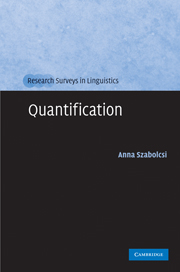Book contents
- Frontmatter
- Contents
- List of figures
- List of tables
- Acknowledgements
- 1 What this book is about and how to use it
- 2 Generalized quantifiers and their elements: operators and their scopes
- 3 Generalized quantifiers in non-nominal domains
- 4 Some empirically significant properties of quantifiers and determiners
- 5 Potential challenges for generalized quantifiers
- 6 Scope is not uniform and not a primitive
- 7 Existential scope versus distributive scope
- 8 Distributivity and scope
- 9 Bare numeral indefinites
- 10 Modified numerals
- 11 Clause-internal scopal diversity
- 12 Towards a compositional semantics of quantifier words
- Notes
- Bibliography
- Index
2 - Generalized quantifiers and their elements: operators and their scopes
Published online by Cambridge University Press: 05 June 2012
- Frontmatter
- Contents
- List of figures
- List of tables
- Acknowledgements
- 1 What this book is about and how to use it
- 2 Generalized quantifiers and their elements: operators and their scopes
- 3 Generalized quantifiers in non-nominal domains
- 4 Some empirically significant properties of quantifiers and determiners
- 5 Potential challenges for generalized quantifiers
- 6 Scope is not uniform and not a primitive
- 7 Existential scope versus distributive scope
- 8 Distributivity and scope
- 9 Bare numeral indefinites
- 10 Modified numerals
- 11 Clause-internal scopal diversity
- 12 Towards a compositional semantics of quantifier words
- Notes
- Bibliography
- Index
Summary
Generalized quantifiers – heroes or old fogeys?
Starting with Montague (1974a) but at least with the almost simultaneous appearance of Barwise and Cooper (1981), Higginbotham and May (1981), and Keenan and Stavi (1986) generalized quantifiers became the staple of formal semantics. For decades it has been taken for granted that they serve as the interpretations of the most widely researched grammatical category in the field, i.e. noun phrases. Nevertheless, there is mounting evidence that generalized quantifiers are not the panacea magna they were once thought to be, and these days one reads more about what they cannot do than about what they can. So are generalized quantifiers a thing of the past? If not, what are they good for? What are the main reasons for them to be superseded, and by what?
Like many other books, this one starts out with generalized quantifiers, but it does so bearing the controversy around them in mind. This will also make it easier to highlight some of the underlying assumptions and some of the firm advantages of generalized quantifiers. Building on these foundations the book will survey two areas of research. One has to do with alternative approaches to scope assignment. The other has to do with the diversity in the behavior of quantifier phrases and with recent attempts to explain it in a compositional fashion. In this way the book will place an emphasis on ongoing work.
- Type
- Chapter
- Information
- Quantification , pp. 5 - 32Publisher: Cambridge University PressPrint publication year: 2010

